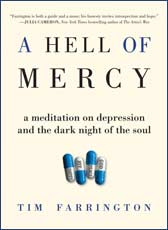"The dark night of the spirit, as understood by John of the Cross, is specifically purgative of this subtler 'spiritual' selfishness, which is ineradicable through the self's own efforts. That John of the Cross is a Doctor of the Church is a joke, in a way, because no one really accepts his diagnosis. He's a sixteenth-century maniac with a thirteenth-century vocabulary; his teachings are daunting, demanding, uncompromising, and relentless, and you have to be extraordinarily miserable before you can really begin to appreciate him. Not exactly the stuff of best sellers in an age of spiritual quick fixes. And the ones who do open up to the truth of what John is saying do so only kicking and screaming all the way.
"John strikes a deathblow to the notion that the deepest spirituality is something we can do, something within the working realm of our will's control and effectiveness. The dark night is about realizing the absolute poverty of our spiritual efforts, the inevitable element of self in even the best of our goodness and striving for the light; it is about being broken by God, stripped naked of all accomplishment and all that we have taken for 'meaning.' It is about trusting God, not because it is the right thing or the good thing or the thing that will advance us spiritually, but because it is the only thing we can do. And to reach that point, all the right things we do and all the good things we do and all the spiritual advances we have believed ourselves to be making must be shown to us for the empty things they are."
